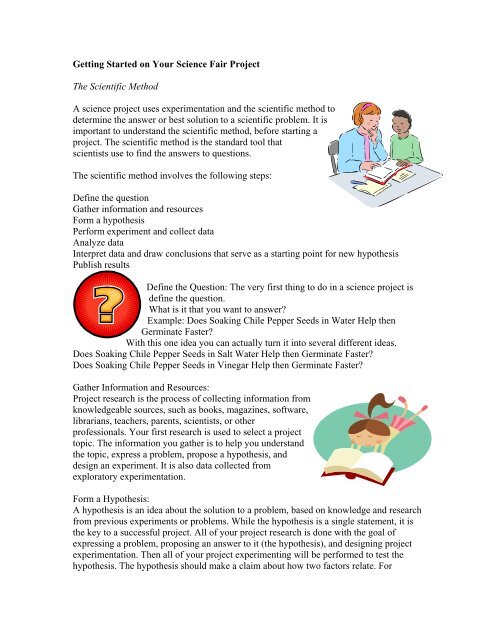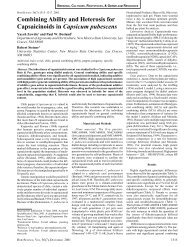Getting Started on Your Science Fair Project The Scientific Method A ...
Getting Started on Your Science Fair Project The Scientific Method A ...
Getting Started on Your Science Fair Project The Scientific Method A ...
You also want an ePaper? Increase the reach of your titles
YUMPU automatically turns print PDFs into web optimized ePapers that Google loves.
<str<strong>on</strong>g>Getting</str<strong>on</strong>g> <str<strong>on</strong>g>Started</str<strong>on</strong>g> <strong>on</strong> <strong>Your</strong> <strong>Science</strong> <strong>Fair</strong> <strong>Project</strong><strong>The</strong> <strong>Scientific</strong> <strong>Method</strong>A science project uses experimentati<strong>on</strong> and the scientific method todetermine the answer or best soluti<strong>on</strong> to a scientific problem. It isimportant to understand the scientific method, before starting aproject. <strong>The</strong> scientific method is the standard tool thatscientists use to find the answers to questi<strong>on</strong>s.<strong>The</strong> scientific method involves the following steps:Define the questi<strong>on</strong>Gather informati<strong>on</strong> and resourcesForm a hypothesisPerform experiment and collect dataAnalyze dataInterpret data and draw c<strong>on</strong>clusi<strong>on</strong>s that serve as a starting point for new hypothesisPublish resultsDefine the Questi<strong>on</strong>: <strong>The</strong> very first thing to do in a science project isdefine the questi<strong>on</strong>.What is it that you want to answer?Example: Does Soaking Chile Pepper Seeds in Water Help thenGerminate Faster?With this <strong>on</strong>e idea you can actually turn it into several different ideas.Does Soaking Chile Pepper Seeds in Salt Water Help then Germinate Faster?Does Soaking Chile Pepper Seeds in Vinegar Help then Germinate Faster?Gather Informati<strong>on</strong> and Resources:<strong>Project</strong> research is the process of collecting informati<strong>on</strong> fromknowledgeable sources, such as books, magazines, software,librarians, teachers, parents, scientists, or otherprofessi<strong>on</strong>als. <strong>Your</strong> first research is used to select a projecttopic. <strong>The</strong> informati<strong>on</strong> you gather is to help you understandthe topic, express a problem, propose a hypothesis, anddesign an experiment. It is also data collected fromexploratory experimentati<strong>on</strong>.Form a Hypothesis:A hypothesis is an idea about the soluti<strong>on</strong> to a problem, based <strong>on</strong> knowledge and researchfrom previous experiments or problems. While the hypothesis is a single statement, it isthe key to a successful project. All of your project research is d<strong>on</strong>e with the goal ofexpressing a problem, proposing an answer to it (the hypothesis), and designing projectexperimentati<strong>on</strong>. <strong>The</strong>n all of your project experimenting will be performed to test thehypothesis. <strong>The</strong> hypothesis should make a claim about how two factors relate. For
example, in the following sample hypothesis, the two relating factors are soaking soluti<strong>on</strong>and germinati<strong>on</strong> rates.Here is <strong>on</strong>e example of a hypothesis:“By using a soaking soluti<strong>on</strong>, we will be able to determine how quickly a chile pepperseed will germinate.”Perform Experiment<strong>Project</strong> experimentati<strong>on</strong> is the process of testing a hypothesis. <strong>The</strong> things that have aneffect <strong>on</strong> the experiment are called variables. <strong>The</strong>re are three kinds of variables that youneed to identify in your experiments: independent, dependent, andc<strong>on</strong>trolled.<strong>The</strong> independent variable is the variable you purposelymanipulate (change). <strong>The</strong> dependent variable is the variablethat is being observed, which changes in resp<strong>on</strong>se to theindependent variable. <strong>The</strong> variables that are not changed arecalled c<strong>on</strong>trolled variables. A c<strong>on</strong>trol is a test in whichthe independent variable is kept c<strong>on</strong>stant in order tomeasure changes in the dependent variable. In ac<strong>on</strong>trol, all variables are identical to the experimentalsetup—your original setup—except for the independentvariable. Factors that are identical in both the experimental setup and the c<strong>on</strong>trol setupare the c<strong>on</strong>trolled variables. Here is where you will start by asking a questi<strong>on</strong>, gatheringmaterials that will help you answer the questi<strong>on</strong> and coming up with a procedure for yourexperiment.Analyze Data:Before you can state the results of an experiment, you mustfirst organize all the data collected during experimentati<strong>on</strong>.Numbers, called "raw data," have little meaning unless youorganize and label them. Data from each experiment needsto be written down in an orderly way.<strong>Project</strong> C<strong>on</strong>clusi<strong>on</strong>project c<strong>on</strong>clusi<strong>on</strong> is a summary of the results of the projectexperimentati<strong>on</strong> and a statement of how the results relate to thehypothesis. Reas<strong>on</strong>s for experimental results that are c<strong>on</strong>trary to thehypothesis are included. If applicable, the c<strong>on</strong>clusi<strong>on</strong> can end bygiving ideas for further testing.<strong>The</strong>A Chile Pepper Institute publicati<strong>on</strong>, New Mexico State University © 2007












